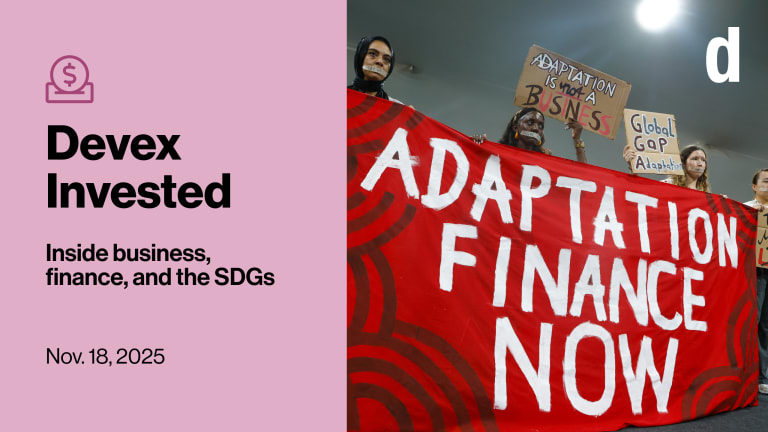At COP 27, joy over 'loss and damage' fund is tempered by reality
A “loss and damage” fund to help climate-vulnerable countries marked a breakthrough in the decadeslong battle to get wealthy countries, whose economic growth fueled the climate crisis, to compensate the poorer countries who are now paying the price for it.
A deal struck at the 27th United Nations Climate Change Conference in Egypt to create a “loss and damage” fund to help countries vulnerable to climate change marked a historic breakthrough in the decadeslong battle to get high-income countries, whose economic growth fueled the climate crisis, to compensate their lower-income counterparts that are now paying the price for it. “Support for these countries, who contribute the least to global heating, but bear the brunt of its worst effects, has long been overdue,” U.N. Development Programme Administrator Achim Steiner said in a statement. Nearly 200 nations came to an agreement in the early hours of Sunday morning in a dramatic turn of events after two weeks of otherwise lackluster negotiations at the Red Sea resort town of Sharm el-Sheikh. The announcement was met with jubilation, although key details need to be ironed out, including who will pay into the fund, what the funding will look like, and who will benefit from it. Still, Teresa Anderson, global lead on climate justice at ActionAid, called it a “real pinch-me moment.” “For people on the front lines of the climate crisis, this offers hope that there will be a fund to help them recover and rebuild in the aftermath of disasters,” she said in a press release. “There are still battles ahead to address key unanswered questions, but for now this is a crucial starting point.” Advocates of loss and damage compensation struggled to even get the issue on the official agenda this year, and their hopes were blunted by years of unfulfilled promises from the previous 26 climate summits. Yet there was a palpable determination among leaders of lower-income countries, particularly small island states, that the implementation of previous pledges would take center stage at this COP and not just the traditional focus on mitigation or reducing greenhouse gas emissions. Against the backdrop of devastating floods in Pakistan and drought in the Horn of Africa, they also pushed for concrete funding for adaptation efforts and, more controversially, loss and damage, also referred to as climate reparations. High-income nations have long resisted the idea of loss and damage payments for fear of being held legally liable for untold sums of money. But an eleventh-hour proposal by the European Union to send aid to vulnerable countries changed the calculus. And despite its past reluctance, the United States agreed to the loss and damage fund. A U.S. State Department source told Devex that the fund will focus on what can be done now to support loss and damage resources, stressing that there is no liability or compensation in the agreement. “This was not easy,” Egyptian Foreign Minister and COP President Sameh Shoukry said in a statement. “We worked around the clock. Long days and nights. Strained and sometimes tense, but united and working for one aim, one higher purpose, one common goal that we all subscribe to and aspire to achieve. In the end we delivered.” How the fund will take shape But the real work is only just beginning. The agreement establishes a “transitional committee” that will make recommendations on how the fund will work ahead of COP 28 in the United Arab Emirates next year. The first meeting of the committee is not expected to take place until late March 2023. The deal also largely punted on the contentious issue of whether China, which is the world’s largest emitter of greenhouse gasses but is still classified as a middle-income country by the U.N., could dip into the fund — a red line for the U.S. and EU. Beijing has said that the onus is on higher-income countries to pay into the fund, while low- and middle-income countries can pitch in on a voluntary basis. Then there’s the issue of how much money the fund will realistically get. A 2009 pledge by wealthy governments to help climate-vulnerable countries with $100 billion in aid per year by 2020 hasn’t even fully materialized yet. “All other promises on climate action lack any ounce of credibility if the $100B promise is not delivered by next year,” the NGO Global Witness said in a statement. U.S. climate envoy John Kerry said President Joe Biden has pledged to work with Congress to scale up U.S. international climate finance to over $11 billion, including $3 billion for adaptation from Congress, “which would make us the single largest contributor of climate finance.” But assuming Congress approves any new climate funding — a big assumption, especially now that Republicans control the House — it would still be a drop in the bucket considering that damages for climate catastrophes could easily run into the hundreds of billions, if not trillions, of dollars. Even U.N. Secretary-General António Guterres was cautious, tweeting that “Clearly this will not be enough, but it is a much-needed political signal to rebuild broken trust.” Climate advocates were also frustrated that there was no tangible progress on the key issues of phasing out the use of fossil fuels or cutting greenhouse gas emissions to limit global warming to 1.5 degrees Celsius above pre-industrial levels. Critics say the text emerging from Sharm el-Sheikh largely mimics what came out of COP 26 in Glasgow. “While progress on loss and damage was encouraging, it is disappointing that the decision mostly copy and pasted language from Glasgow about curbing emissions, rather than taking any significant new steps,” Ani Dasgupta, president and CEO of the World Resources Institute, said in a statement. Dasgupta added it is “mindboggling that countries did not muster the courage to call for phasing down fossil fuels, which are the biggest driver of climate change.” A first step and a long road ahead Still, for all the skepticism, there was tepid optimism. Fredrick Njehu, senior policy adviser on climate at Tearfund, called the fund a “glimmer of hope” in a statement. Farah Naureen, the Pakistan country director for Mercy Corps, said that “Anything less than this would have jeopardized trust in the climate negotiations and would have left countries like mine, Pakistan, paying the price.” “While there is much work to do to agree on the details — including the need for both additional public funding and innovative sources of finance — this new Loss and Damage fund is critical to address the dramatic impacts of the climate crisis on women, men, and children who have no resources to build resilience and adapt,” Naureen added. The fact that this historic milestone took place on African soil, home to some of the countries most at risk by extreme weather, was also symbolically powerful. “There were high hopes that COP27 would deliver for Africa – and on the issue of loss and damage it has,” Susan Otieno, executive director at ActionAid Kenya, said in a statement. “For the millions of people across East Africa who are at risk of starvation after endless drought; for the girls who are being taken out of school to walk miles for water; and for the families in Nigeria who have been displaced from their homes from extreme flooding, they will now know that the world stands in solidarity with them,” she added. “But this is only the first step, and the negotiations next year must address the many questions still hanging on how it will work in practice.” Shabtai Gold and Sara Jerving contributed to this report.
A deal struck at the 27th United Nations Climate Change Conference in Egypt to create a “loss and damage” fund to help countries vulnerable to climate change marked a historic breakthrough in the decadeslong battle to get high-income countries, whose economic growth fueled the climate crisis, to compensate their lower-income counterparts that are now paying the price for it.
“Support for these countries, who contribute the least to global heating, but bear the brunt of its worst effects, has long been overdue,” U.N. Development Programme Administrator Achim Steiner said in a statement.
Nearly 200 nations came to an agreement in the early hours of Sunday morning in a dramatic turn of events after two weeks of otherwise lackluster negotiations at the Red Sea resort town of Sharm el-Sheikh.
This article is free to read - just register or sign in
Access news, newsletters, events and more.
Join usSign inPrinting articles to share with others is a breach of our terms and conditions and copyright policy. Please use the sharing options on the left side of the article. Devex Pro members may share up to 10 articles per month using the Pro share tool ( ).
Anna Gawel is the Managing Editor of Devex. She previously worked as the managing editor of The Washington Diplomat, the flagship publication of D.C.’s diplomatic community. She’s had hundreds of articles published on world affairs, U.S. foreign policy, politics, security, trade, travel and the arts on topics ranging from the impact of State Department budget cuts to Caribbean efforts to fight climate change. She was also a broadcast producer and digital editor at WTOP News and host of the Global 360 podcast. She holds a journalism degree from the University of Maryland in College Park.








